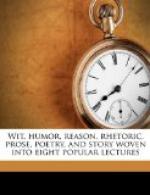When introduced there was a painful silence. I began by saying: “Doubtless many of you have come to hear what an American has to say about Venezuela. I must admit I am not acquainted with the merits of the question. I suppose, however, the message of our President is one of the arts of diplomacy. But I do know I speak the sentiment of the best people of my country when I say: ’May the day never dawn whose peace will be broken by signal guns of war between Great Britain and the United States.’” I said:
“When John and Jonathan forget,
The scar of anger’s wound to fret,
And smile to think of an ancient feud,
Which the God of nations turned to good;
Then John and Jonathan will be,
Abiding friends, o’er land and sea;
In their one great purpose, the world
will ken,
Peace on earth, goodwill to men.”
The great audience arose and cheered until all sense of chill had departed.
It is not only an art to get hold of an audience, but equally a matter of good taste to know when to let go. This is a qualification some have not acquired. I followed a very distinguished man several years ago and the comment was: “He was fine the first hour and a half, but the last hour he grew tiresome.”
In this busy age, the world wants thoughts packed into small compass. The average audience wants a preacher to put his best thoughts into a thirty-minute package. The day was, when people would sit on backless board benches and listen to a sermon of two hours; now they won’t swing in a hammock and endure one of more than fifty minutes.
Rev. Dr. Dewey, of Brooklyn, New York, tells of a minister who was given to reading his sermons. On one occasion when he had read about twenty minutes, he halted and said: “I have a young dog at my house that is given to chewing paper. I find he has mutilated my manuscript, which is my excuse for this short sermon.” A visiting lady after service said: “Doctor, have you any more of the breed of that dog? I would like to get one for our pastor.”
In this age of crowded moments concentration means executation; energy means success. If you can’t put fire into your sermon, put your sermon in the fire.
A few years ago when in New York City, I went to see Madame Bernhardt in her famous play, Joan of Arc. She spoke in French, an unknown tongue to me; but when she came to her defense before the court, I realized as never before the power of speech and action. She had given one-fourth of that marvelous appeal, when the great audience arose and began to cheer. Madame Bernhardt folded her arms, bowed her head and waited for silence.
When order was restored she sprang a step forward. It seemed to me every feature of her face, every finger on her hands, every gleam of eye and movement of body was an appeal to the stern tribunal. In the trembling, murmuring voice that ran like a strain of sad, sweet music through sunless gorges of grief, the great audience read her plea for mercy and wept. Some who could not restrain their emotion sobbed aloud.




